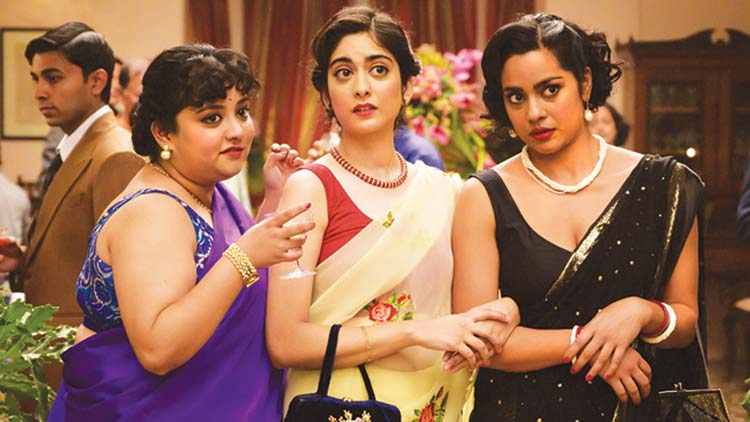Features
Recent Indian films outclass most Hollywood movies

 The major film awards – the 96th Oscars or Academy Awards – were awarded at a glittering event last weekend. Christopher Nolan directed Oppenheimer won eight Oscars, being nominated for 13. In all it has won 30 trophies. Record for most Oscars is jointly held by Ben Hur, Titanic and Lord of the Rings, each winning 11 Oscars. This global interest in films gave me the reason to write about an impression that has grown in me after seeing Netflix films. The selection offered in different areas of the world appears to be different. We in this geographical area seem to be having more eastern films, Hindi and Tamil mostly. My son in the US advises me to watch this or that film – not available in my Netflix streaming.
The major film awards – the 96th Oscars or Academy Awards – were awarded at a glittering event last weekend. Christopher Nolan directed Oppenheimer won eight Oscars, being nominated for 13. In all it has won 30 trophies. Record for most Oscars is jointly held by Ben Hur, Titanic and Lord of the Rings, each winning 11 Oscars. This global interest in films gave me the reason to write about an impression that has grown in me after seeing Netflix films. The selection offered in different areas of the world appears to be different. We in this geographical area seem to be having more eastern films, Hindi and Tamil mostly. My son in the US advises me to watch this or that film – not available in my Netflix streaming.
I came to the conclusion conveyed in my title this Sunday after seeing a couple of movies a week – a justifiable time-spender at my age. I watched Julia Roberts in a film about breaking up a marriage – My Best Friend’s Wedding (1997) after watching a Hindi film and found the Hollywood film trite and trivial – all froth, bubble and glamour against the starkly realistic Hindi film. Why? The Indian films I have watched recently have all dealt cleverly with Indian social norms, customs or beliefs. Messages have been conveyed skillfully and adroitly, with no in-your-face sermonizing. I also seem to relate more to the background, clothes, even acting styles of the Hindi films which certainly are not those Bollywood blockbusters directed and produced for mass entertainment.
General family norm
The very best was the Mira Nair directed adaptation of Vikram Seth’s huge novel published in 1993: A Suitable Boy. The film was screened in 2020 with BBC co-producing. Entertainment was its top priority and the custom/norm presented principally was that a young girl needed to be married off and the usual practice of a mother’ quest for a suitable marriage partner, roping in others to help her.
The story line goes thus: in 1951 when girls had more freedom and went in for higher studies, vivacious Lata Mehra is in university and develops a relationship with a Muslim co-student. Knowing her mother wants her to consent to an arranged marriage, she suggests they elope. Caution and seeing things clearer, he refuses a sudden decision. Finally after much searching, she consents to a suitable, simple man who works for a Czech shoe factory in India.
The themes Seth deals with are limited autonomy to girls of good families; marriage being the be all and end all in mothers’ views for their daughters. With this, he introduces sub themes – the Muslim Hindu conflict; rich men’s penchant for mistresses, lovely courtesans who live in luxury through their availability and singing prowess; and justice and injustice. The film is a brilliant classic for all time.
Dalits and discrimination
These two issues and concerns were so successfully portrayed in the documentary titled Daughters of Destiny which Academy Award winning director Vanessa Roth filmed for seven years chronicling the growing up of four girls living through term time at Shanthi Bhavan and returning to their slum homes for holiday months. Shanthi Bhavan is the home offered to 24 Dalit children each year – 12 boys, 12 girls – from the age of four to adulthood and even funding university education.
Shanti Bhavan Children’s Project was the brain child of Dr Abraham George, Indian American businessman, assisted by his brother Ajit. In 1995 the non-profit organization – The George Foundation – was set up and two years later Shanti Bhavan opened its welcoming doors to very poor, outcast Dalit children. Based in Bangalore, Karnataka, it has at present 300 students who are taught in the English medium. I wrote about this film earlier. The success of helping Dalit youth to integrate themselves in society is wonderful. The messages were strong: all are equal; helping and sharing is humaneness; caring and guiding reap good results.
Widows and stigmatization
A 2018 film directed with a sure hand, produced with sophistication and acted with constraint and skill was Sir. Directed by Rohena Gera it is a romantic film which subtly deals with two Indian slur-issues: the negative, looked down upon status of widows and social class divisions.
Ashwin returns to Mumbai from New York to support his father’s building business and to get married. However, the marriage does not take place. The live-in maid, Ratna, hired by his mother in anticipation of the marriage, is kept on. She is no more than a shadow in Ashwin’s flat, running it perfectly while cooking and serving his meals, and having a life of her own in spare hours with another maid. Ratna’s ambition is to be a dress designing seamstress. Getting to know this as she asks permission to be out of the flat for afternoons, Ashwin buys her a sewing machine.
Things come to a head when she is asked by his mother to cook and serve at a party. She does it but inadvertently spills a dish on a socialite who berates her. Ashwin is upset, further concerned when he sees Ratna with other servants seated on the floor of the kitchen having dinner. She tells him she was widowed at 17 and ostracized in her village. Her aim is to educate her sister and better herself. He realizes he is in love with her But contains himself. Much later, he kisses her.
She leaves her job and his flat and moves to her sister’s slum tenement; a relationship not being at all suitable or possible. He tells his father he intends marrying Ratna, goes back to New York after arranging her apprenticeship with a dress designer. Ratna settles to a poor life again. He phones her. She who always called him Sir, realizing his sincerity and her love for him, addresses him as Ashwin. The film cleverly ends at this point. No obvious comment on issues dealt with but succeeded with finesse.
Corruption vs Honesty
12th Fail – a 2023 Hindi film subtitled in English was truly remarkable. It is directed, produced and written by Vidhu Vinod Chopra, based on the non-fiction book by Anurag Pathak of Manoj Kumar Sharma, born and bred in dacoit infested Chambal where corruption is rife and even school students are encouraged to cheat to pass the all-important Grade 12 exam. Manoj’s father being totally honest is dismissed from his job for hitting his corrupt boss with his shoe.
Manoj, influenced by a straight police officer, does not cheat at his exam. He fails while others pass. Determination and extreme hard living, but helped by friends, Manoj does pass the final exam to enter the Indian Police Service. The man in the interview board rejects him as 12th Failed but the women pick up his honesty. Manoj returns home in his police uniform.
The film received wide acclaim and won five Filmfare awards for best director, film and actor.
Other social issues
I fail to recall the name of the Hindi film that dealt with child abuse, trafficking and prostitution, but it was excellent. The story wove around a woman rights activist who met a young girl who had been traumatized, but kept mum. The activist felt impelled to investigate further and uncovered thugs in cohorts with the management of a home for destitute children. The girl tells her tale, many women and children are saved and the crime perpetrators duly punished.
Martial violence is the social theme dealt with in Darling. This very pretty and very young girl succumbs to the violence of her husband, by nature violent but taking to excessive alcohol intake too. The film started off well, but the girl turns tables and keeps husband captive in their flat with her mother living in the same building, conniving. The story turned farcical, lightweight and rather ludicrous. I gave up watching it.
To look forward to To Kill a Tiger
directed by Nisha Pahuja is about a family in Jharkamd, India, who campaign for justice after their teenage daughter is brutally raped. Deepa Mehta, Dev Patel, Priyanka Chopra, among others, were co-producers. It was released in Toronto in 2022 and in US in 2023 with
The film was nominated as Best Documentary Feature for an Oscar this year, competing with 20 Days in Mariupol (Ukraine war), Bobi Wine: the People’s President, Four Daughters and The Eternal Memory. The war film won the Oscar; however honour enough for Canada and India to be nominated.
Streaming on Netflix and widespread screening was delayed till the 96th Oscar ceremony this year was over. Hence here is a film to be seen, again assuredly dealing with skill, sensitivity and finesse on a scourge rampant in India: rape.
Features
The political Right as an obstacle to reconciliation

 That the political Right in Israel constitutes one of the obstacles to bringing a measure of relief to the people of Gaza and those of other contested territories in the Middle East ought to be now plain to see. Some of Israeli Prime Minister Benjamin Netanyahu’s recent pronouncements, for instance, on the issues in the Gaza make this amply clear, given that the Netanyahu regime’s Rightist proclivities have been very much in evidence over the past few years.
That the political Right in Israel constitutes one of the obstacles to bringing a measure of relief to the people of Gaza and those of other contested territories in the Middle East ought to be now plain to see. Some of Israeli Prime Minister Benjamin Netanyahu’s recent pronouncements, for instance, on the issues in the Gaza make this amply clear, given that the Netanyahu regime’s Rightist proclivities have been very much in evidence over the past few years.
The Netanyahu regime has been rooting firmly for the advancement of Israel’s security considerations and this is to be expected of any administration that has got its priorities right. Given Israel’s current challenges, it shouldn’t come as a surprise if national security is prime among its concerns and the international community couldn’t expect it to be otherwise. However, Israel should take clear note of the fact that its expansionist ventures in the region have only earned it worldwide condemnation and compounded its security concerns. If it has hardly any international supporters today, it has only itself to blame.
Essentially, the problem in the Middle East, and this has all along been the case, is to evolve a political solution that would recognize the right to exist without fear of all the main parties to the tangle. Such a solution would prove comparatively easy to arrive at if the prime antagonists in the region opt to be flexible in their policy positions and thinking on the issues that are central to the Middle East problem. In the case of the Netanyahu regime, such flexibility has not been manifesting easily and this has trammeled the path to a political solution.
It is a prime characteristic of Rightist regimes to be inflexible on issues central to national security and in the case of the Netanyahu administration this has clearly been the case. Given such policy rigidity it should not come as a surprise if current international negotiations aimed at resolving the Middle East crisis are proving deadlocked.
To compound matters, the Netanyahu regime is proving impervious to international opinion even when such pronouncements come from quarters that member states of the international system are expected to give some ear to and consider deeply. For example, International Court of Justice (ICJ) orders that Israel should do everything in its power to prevent, death, destruction and ‘acts of genocide’ in the Gaza seem to be falling on deaf ears in Tel Aviv. The same goes for ICJ orders that the human rights situation in the conflict zone be improved.
More recently, reacting to International Criminal Court (ICC) criticisms of his regime Netanyahu is on record as having said that if the ICC issues arrest warrants for his regime’s officials on charges relating to the manner in which Israel has been carrying out its war against Hamas, ‘it would be a scandal on a historical scale.’ Netanyahu is insistent that his regime has done nothing wrong to attract the charge that Israel’s war against Hamas is in any way ‘genocidal’, for instance.
Rejecting such strictures, the Israeli Prime Minister is of the view that it is Israel that is being subjected to ‘genocide’ and ‘terror’ by Hamas. He said it is highly ironical that Israel which was subjected to genocide at the hands of the Nazis is thus being ‘put in the dock’ by sections of the world community on charges that are, from his viewpoint, untenable.
Intransigence of the above kind should only be expected of hardline, Rightist regimes and the world would do well to recollect the invasions Nazi Germany carried out in Europe in the run-up to World War Two, dismissing in the process the authority of the League of Nations. It would be relevant to also recollect that wars waged on national security considerations are central to Rightist regimes’ strategies of survival. It is in this light that the Netanyahu regime’s current policy rigidity needs to be considered.
However, there is no getting over the fact that Israel’s security fears are harshly real and a negotiated settlement in the Middle East, leading to reconciliation among the warring groups, is unthinkable without resolving Israel’s apprehensions over its security on an urgent basis. The Two State solution may have been tried, tested and rejected but it remains the most rational basis to a negotiated settlement. Going forward, the world community would be erring badly if it glosses over Israel’s security considerations.
Moreover, the international community would need to realize that Israel’s neighbours in the Arab world are by no means a re-assuring presence from its standpoint. While there is no denying the harmful impact that Israel’s intransigence would be having on peace hopes it is equally important to take cognizance of some of its neighbours’ destructive hardline positions on issues in the Middle East imbroglio that are standing in the way as well of fruitful negotiations and reconciliation among the relevant antagonists.
Such short-sightedness is particularly true of the global South. Palestinian disaffection is completely justified and its right to statehood cannot be denied but Palestine and its supporters cannot refuse to see the value of cultivating a degree of flexibility in their policy positions as regards Israel and recognize that the latter’s concerns are almost identical to most of their worries. The lack of such recognition has played a huge role in perpetuating the Middle Eastern blood-letting over the decades. Those sections currently agitating in the US and other countries over the Gaza blood-letting would need to be perceptive of this fact.
Meanwhile, there is the case of Iran whose pronouncements in this connection could only cause panic among Israel’s ordinary citizenry and the peace-loving world. Iran’s political class is on record as vowing to bomb Israel out of existence and such dangerously irresponsible rhetoric could in no way be reassuring for Israel and help in easing its main security concerns. In fact it would only contribute substantially towards Israel’s intransigence.
Given this backdrop, it would be futile for Iranian President Dr. Ibrahim Raisi to comment to the effect that, ‘the international community and international organizations have done little to stop the massacre of civilians in the Gaza.’
Rather than question the effectiveness of international organizations, the Iranian President would do well to consider as to what constructive steps his regime could take to bring the warring sides to the negotiating table. That is, what could his government do to foster a spirit of peace in the Middle East?
International organizations are not in possession of ‘magic bullets’ that could produce peace in a flash as it were. International and regional peace is premised on the good will and support of the totality of the world community. By supporting international peace efforts in a non-partisan manner Iran could pave the way for peace in the Middle East.
Features
Doing it for Sri Lanka …Down Under

 Sri Lanka is certainly on the right track where tourism is concerned.
Sri Lanka is certainly on the right track where tourism is concerned.
From a trickle, due to the pandemic, the market is now booming, where most holidaymakers are now making Sri Lanka their Number One destination.
Of course, the right promotion of our beautiful island also plays an integral part in attracting tourists.
A tourism promotion event, with Sri Lanka in the spotlight, was held in Melbourne, last month, with Australian dignitaries, including Cricket Australia CEO Nick Hockley, and former Cricket Victoria CEO Ken JACOBS, and several holidaymakers, present.
Thema Collection and Connaissance De Ceylan, in collaboration with SriLankan Airlines, hosted this event, at Upali’s Melbourne, captivating the attention of several Australians planning to visit Sri Lanka. This event was to spotlight Sri Lanka as an attractive destination for holidays, cricket tours, and wildlife expeditions.

Dream holiday in Sri Lanka…winner
(centre) with S.P. Mohan and Maxime
Wickramasinghe
The event unfolded with a series of attractive presentations, with Maxime Wickramasinghe, Director of Marketing and Business Development, Thema Collection and Connaissance De Ceylan, delivering insightful insights into the tourism prospects of Sri Lanka, while S.P. Mohan, the country head of SriLankan Airlines, enriched the audience’s understanding with a comprehensive overview of insights into the ease of travel and the diverse offerings available through SriLankan Airlines.
A Q & A session followed with a panel doing the needful about Sri Lanka.
Connaissance De Ceylan and Thema Collection are part of a proud family-owned company in Sri Lanka.

Distinguished guests in conversation…and
it’s all about Sri Lanka
With over four decades of expertise in the Sri Lankan travel industry, Connaissance De Ceylan stands as a distinguished leader in providing immersive and authentic travel experiences. Their unwavering commitment to curating memorable journeys stems from a deep-rooted belief in sustainable and ethical business practices. Their mission prioritises people and the preservation of local culture while sourcing from Sri Lanka’s vibrant communities.
Thema Collection, on the other hand, comprises boutique hotels, resorts, and retreats across Sri Lanka, all of which showcase the island’s rich cultural heritage and unparalleled biodiversity through a diverse array of attractions and experiences.

David Cruse and Johann Jayasinha, of the organising
committee, with Cricket Australia CEO Nick Hockley,
and former Cricket Victoria CEO Ken JACOBS
Thema Collection is also committed to making a positive impact on both the local community and the environment, ensuring that every stay with them contributes to a sustainable and responsible future for all.
What made the event, in Melbourne, truly memorable was the warmth and hospitality extended by Johann Jayasinha, David Cruse, Cathy Cruse, and the dedicated committee behind the scenes. Attendees were treated to an unforgettable dining experience, further enhancing the ambiance of the evening.
The climax of the evening arrived with the announcement of two lucky winners, who won two amazing prizes—a complimentary return airticket to Sri Lanka, plus a luxurious seven-night stay at Thema Collection hotels.

Q & A panel
As the event came to an end, it left an indelible mark on all those present, reinforcing Sri Lanka’s position as a premier tourist destination.
With its rich heritage, diverse landscapes, and warm hospitality, Sri Lanka beckons travellers from around the globe to experience the magic it has to offer.
Features
Turmeric and Chickpea Flour Scrub

 For a more radiant and glowing complexion, and a brighter and smooth complexion, I suggest you follow these steps:
For a more radiant and glowing complexion, and a brighter and smooth complexion, I suggest you follow these steps:
Start by cleansing your face with a gentle cleanser to remove any makeup, dirt, and impurities.
In a small bowl, mix 01 tablespoon of turmeric powder with 02 tablespoons of chickpea flour.
Add enough water to the mixture to form a smooth paste, with a thick, spreadable consistency.
Dampen your face with lukewarm water to prepare your skin for exfoliation.
Using clean fingertips, scoop a small amount of the paste and gently massage it onto your damp skin. Do it in circular motions.
Focus on areas where you want to exfoliate, such as the forehead, nose, cheeks, and chin, but avoid the delicate eye area.
Continue massaging the scrub into your skin for a few minutes, allowing the chickpea flour to slough off dead skin cells and reveal a brighter, smoother skin.
Once you’ve thoroughly exfoliated your skin, rinse off the scrub with lukewarm water.
Pat your skin dry with a clean towel and follow up with your favourite moisturizer to lock in hydration.
Benefits of this Scrub:
Chickpea flour gently removes dead skin cells and impurities from the surface of the skin. This helps to unclog pores, prevent breakouts, and promote cell turnover for a brighter complexion.
Turmeric helps to brighten the skin and reduce the appearance of dark spots, hyperpigmentation, and uneven skin tone. Regular use of turmeric can help reveal a more radiant and glowing complexion.
Both turmeric and chickpea flour have anti-inflammatory properties that help to soothe irritation, redness, and inflammation. This makes the scrub suitable for all skin types, including sensitive skin.
Let me add that chickpea flour is rich in nutrients, such as vitamins, minerals, and protein, which nourish and hydrate the skin, leaving it feeling soft, smooth, and supple after exfoliation
-

 Business6 days ago
Business6 days agoSri Lanka Resorts of Cinnamon Hotels & Resorts mark Earth Day with impactful eco-initiatives
-

 Business7 days ago
Business7 days agoDialog Axiata recognised as the Most Significant FDI Contributor by BOI
-

 Business7 days ago
Business7 days agoUNESCAP Technical Cooperation Highlights Report flags significant strides in its partnership with Sri Lanka
-

 Business2 days ago
Business2 days agoINSEE Ecocycle marks 21 years of environmental excellence with a city cleaning program in Anuradhapura
-

 News5 days ago
News5 days agoGerman research ship allowed Sri Lanka port call after Chinese-protest led clarification
-

 News5 days ago
News5 days agoSri Lankan Oil and Gas exploration grinds to a standstill amid protracted legal battle
-

 Editorial7 days ago
Editorial7 days agoShocks from Bills
-

 Features3 days ago
Features3 days agoCalling applications for MBBS!



















